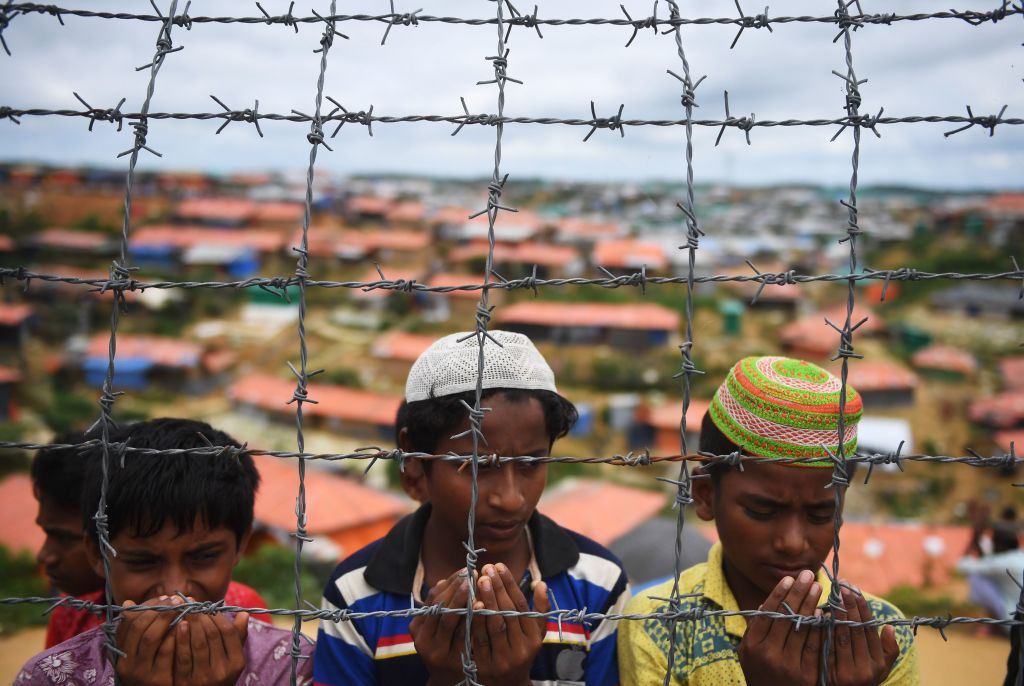U.N. report urges Rohingya 'genocide' trial for Myanmar military leaders


A free daily email with the biggest news stories of the day – and the best features from TheWeek.com
You are now subscribed
Your newsletter sign-up was successful
On Monday, a team of investigators from the United Nations-backed Human Rights Council released a scathing report on Myanmar's military campaign against the Rohingya Muslim minority, recommending that the nation's military rulers be prosecuted for genocide. The list of six named leaders includes Myanmar's commander in chief, Min Aung Hlaing. The report also criticized the head of government, Nobel Peace Prize laureate Aung San Suu Kyi, for failing to intervene to stop the violence, including by using her "moral authority."
The three-member Independent International Fact-Finding Mission on Myanmar was sent to investigate human rights abuse in Myanmar, especially in Rakhine state, six months before the military started its crackdown on the Rohingya a year ago. The U.N. mission was not allowed into Myanmar, but through hundreds of interviews with refugees who fled Myanmar and satellite images, among other evidence, the report documented crimes including gang rape, the enslavement and killing of children, and burning of entire villages. The report said a "conservative" estimate is that 10,000 people were killed in the military purge, and some 700,000 Rohingya have fled, mostly to neighboring Bangladesh.
"The crimes in Rakhine state, and the manner in which they were perpetrated, are similar in nature, gravity, and scope to those that have allowed genocidal intent to be established in other contexts," the report said. It recommended that the Myanmar atrocities be referred to the International Criminal Court (ICC) or, if the ICC is not a viable option — Myanmar is not a member and China could block such a move in the U.N. Security Council — prosecuted through a special tribunal. "Genocide is the most serious charge that can be made against a government, and is rarely proposed by U.N. investigators," says BBC Southeast Asia correspondent Jonathan Head. But the team apparently believes it can prove "genocidal intent," a high legal bar last met in Bosnia and Rwanda in the 1990s.
The Week
Escape your echo chamber. Get the facts behind the news, plus analysis from multiple perspectives.

Sign up for The Week's Free Newsletters
From our morning news briefing to a weekly Good News Newsletter, get the best of The Week delivered directly to your inbox.
From our morning news briefing to a weekly Good News Newsletter, get the best of The Week delivered directly to your inbox.
A free daily email with the biggest news stories of the day – and the best features from TheWeek.com
Peter has worked as a news and culture writer and editor at The Week since the site's launch in 2008. He covers politics, world affairs, religion and cultural currents. His journalism career began as a copy editor at a financial newswire and has included editorial positions at The New York Times Magazine, Facts on File, and Oregon State University.
-
 The problem with diagnosing profound autism
The problem with diagnosing profound autismThe Explainer Experts are reconsidering the idea of autism as a spectrum, which could impact diagnoses and policy making for the condition
-
 What to know before filing your own taxes for the first time
What to know before filing your own taxes for the first timethe explainer Tackle this financial milestone with confidence
-
 The biggest box office flops of the 21st century
The biggest box office flops of the 21st centuryin depth Unnecessary remakes and turgid, expensive CGI-fests highlight this list of these most notorious box-office losers
-
 British warship repels 'largest Houthi attack to date' in the Red Sea
British warship repels 'largest Houthi attack to date' in the Red SeaSpeed read Western allies warn of military response to Iranian-backed Yemeni rebels if attacks on ships continue
-
 Houthi rebels claim Red Sea ship attacks
Houthi rebels claim Red Sea ship attacksspeed read Iran-backed Yemeni group vows to escalate aggression towards Israel-linked vessels in revenge for Gaza war
-
 Israel plans next phase of Gaza war as first hostages released
Israel plans next phase of Gaza war as first hostages releasedSpeed read After four-day ceasefire 'we will not stop' until destruction of Hamas, says Israel
-
 Mob storms Russian airport 'looking for Jews'
Mob storms Russian airport 'looking for Jews'Speed Read Plane from Israel surrounded by rioters chanting antisemitic slogans after landing in Russia's Dagestan region
-
 Tuberville's military promotions block is upending lives, combat readiness, 3 military branch chiefs say
Tuberville's military promotions block is upending lives, combat readiness, 3 military branch chiefs saySpeed Read
-
 Ukraine's counteroffensive is making incremental gains. Does it matter in the broader war?
Ukraine's counteroffensive is making incremental gains. Does it matter in the broader war?Speed Read
-
 US commissions first-ever Navy ship in a foreign port
US commissions first-ever Navy ship in a foreign portSpeed Read
-
 British spy chief, Wagner video suggest Prigozhin is alive and freely 'floating around'
British spy chief, Wagner video suggest Prigozhin is alive and freely 'floating around'Speed Read
